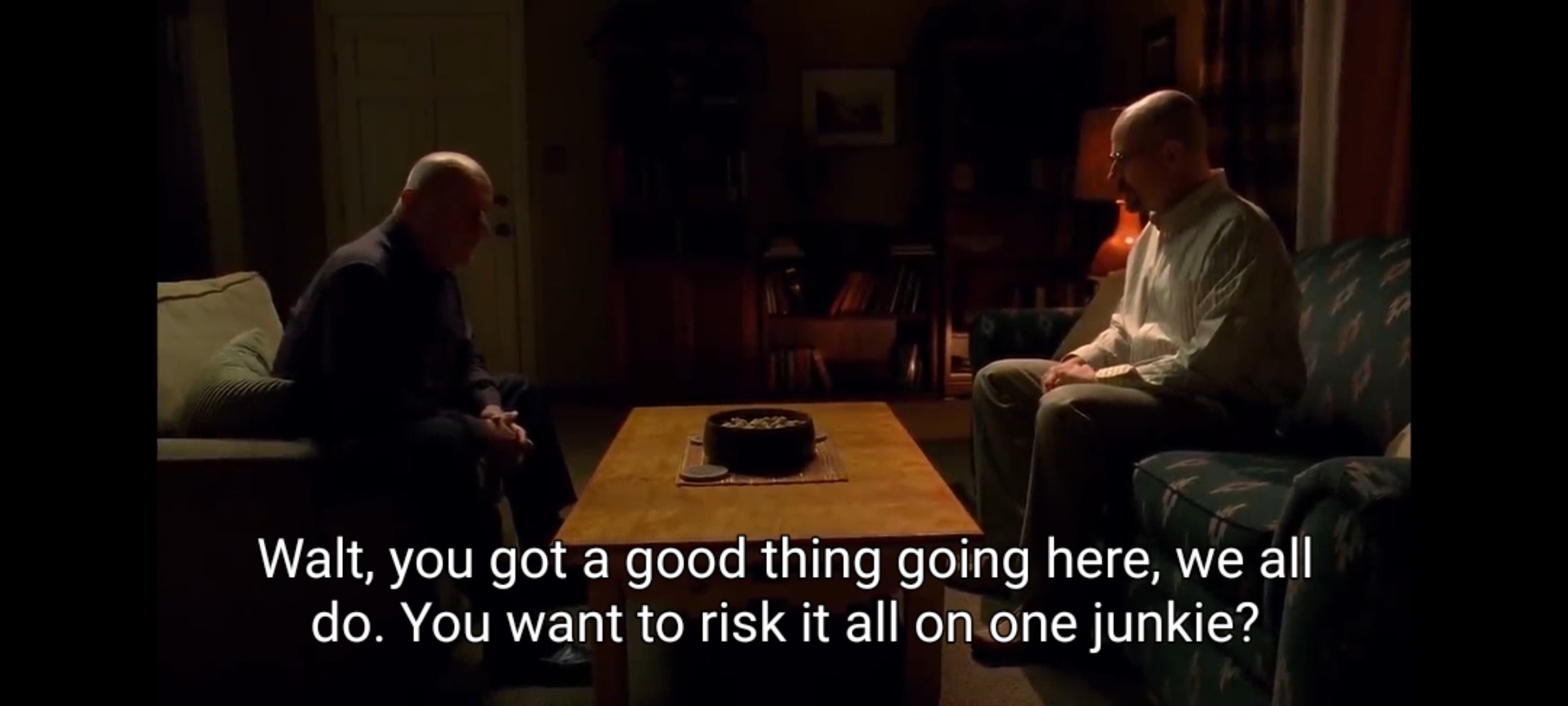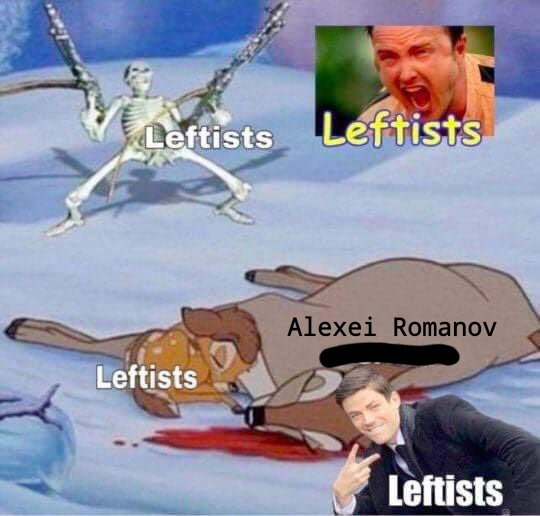Apologies for posting.
I should say by way of introductory remarks, that while this is an effort post, it is an effort post on a shitposting website, and thus ab initio a shitpost and therefore be taken in the correct spirit of levity in which it is intended. Don't get my thread locked.
Recent discussion on here has touched on the moral status of the execution of the Romanov family by Bolsheviks ahead of the advancing White Army1. While not exactly of practical significance given how few of us have Royal Families locked up in our basement, it did reveal several significant, (sometimes severe) differences in the philosophical underpinnings of the posters on this website.
A Moral Communism
Moral status as such actually has very little to deal with communism/leftist (in the Marxian vein) in terms of it's internal mechanism. Marx, Engels, Lenin, and the rest of that intellectual lineage2. famously thought very little of moral philosophy. A communist is thus entirely at liberty to dismiss this entire discussion as idealism, and observe that within a Marxist framework, there are no 'good' and 'bad', merely a historically deterministic sequence of class antagonisms that will eventually resolve in favor of the proletariat and thus choosing to be a communist is merely choosing to throw one's hat in with the predetermined victors. This strand of amoral communism thus is not terribly interested in this discussion, and anyone here that adheres to that framework is excused from the discussion as having won the argument.
Given the rest of us do have moral considerations that prefigure our political beliefs, it's necessary for us to sketch out at least a scaffolding for what moral commonalities leftists share before going further, lest we fall into a morass of fundamentally incompatible frameworks stemming from different axiomatic premises. Speaking from my own personal position, I ascribe to leftist political positions as they offer me the greatest promise of granting a comfortable and dignified existence to the largest number of people possible. That in of itself does not make a moral axiom though, as achieving a large amount of something is valueless if the individual components don't themselves have value, and therefore, and a fundamental value informing my politics is the axiomatic value/sanctity of human life. So I am taking on as an assumption that generally speaking, want everyone to have dignified and comfortable lives3. If that position doesn't more or less describe you, you are also excused as having won the argument.
Justifying Shooting a Tsesarevich in my Pajamas
Which brings us to the Romanovs. In keeping with 3. above, and considering the minor children of royals not culpable for the systematic injustices perpetrated under the dictatorship of their parents, we'll limit our discussion here to the minors (Anastasia, and especially Alexei), though I think the general outline of the argument can be applied to pretty much all of the Tsar's issue. The entirety of the family, along with their retinue, were bulleted and bayoneted in Yekaterinburg about 10 days before white occupied the city. In attempting to defend the legacy of one of the most politically successful socialist projects in history4., this action has largely been justified on the left. Examining the commonly proposed justifications in light of our moral principles finds them universally lacking.
- It was necessary in order to safeguard the immediate success of the revolution against an individual with claim to the throne.
This argument goes that while we do value human life and dignity, our efforts to maximize these will sometimes require that certain human lives be forfeit, essentially turning this into a trolley problem5.. This argument differs in an important aspect from the trolley problem in that the trolley problem consists of single moment in time with clearly articulable and certain outcomes given at the outset. Leaving Alexei alive was in no way certain to doom the revolution to failure of significant struggle, as he could have been maintained in custody, and ascribing such outsized influence on the course of political affairs to the life of a sickly 13 year old is a profoundly anti-materialist approach to history. History is replete with challenges to establish socialist authority6., none of which stemmed from claimants to the Imperial thrown. Further, liquidating the Tsar, his children, and his brother did not exhaust the Romanov line, his cousin could and did proclaim himself Emperor-in-exile, and despite being old enough to actually head a restorationist intervention, none materialized. So the notion that killing Alexei was necessary fails to stand up to scrutiny 7.. It is also worth noting as an aside that the Romanovs were deeply unpopular, and to wit, were not the government the Bolshevik revolution occurred under, and supporters of the provisional government (domestic and international alike) formed the overwhelming contingent of the White forces, and the notion that a 14 year old tsarist claimant to the thrown would have had a meaningful impact on that colossal clusterfuck strains credulity.
- It prevented a longterm challenge to Boshevik control in a manner similar to Jacobite uprisings or the Bourbon Restoration.
Taking a more longterm view of the problem, it might be acknowledged that the Alexei presented no immediate threat justifying his liquidation, but, drawing from the history of pre-CIA regime changes, he presented a longterm likely/probable/plausible/possible threat in the form of an eventual challenge, and that acting in light of that possibility was justified if not strictly necessary. If we wish to examine this in light of our moral principles, we need to develop some notion of probability calculus; at what point is taking in innocent life now justified in order to avoid certain possible harms that have a certain probability of occurring. You can formalize this to ridiculous extents8., or you can take the legal systems more qualitative approach, of establish some standard of proof (you are, after all, justifying killing someone), where the execution is deemed justified if seems more likely than not/clearly and convincingly/beyond a reasonable doubt that it will prevent further, greater harm in the future. This lets you weaken the requirement that it is necessary to kill him to merely it is prudent to kill him. What is lacking though is any evidence that anyone has meaningfully carried out this process for any standard beyond plausible. The greatest extent to which this is established is that historically, there have been several restorationist insurrections, but no systematized historical study has been undertaken to quantify the risk of insurrection/coup in the presence or absence of an legitimate claimant.9.
Well perhaps we leave it there; a plausible narrative that places Alexei as the cause of some harm is sufficient in our eyes to justify his liquidation. The problem with this is that it is such a liberal standard that it can be applied to nearly everyone. There are scores of documented peasant rebellions throughout history, so by the same standard it is plausible that any given peasant may be at risk for launching a peasant rebellion down the line and thus, by that same standard, we are justified in liquidating them. Universalizing from this generic peasant^.10. to all peasants. And thus our system named aimed an providing dignity and comfort is able to justify pretty much any atrocity.
- The moral culpability of for the executions lies at the feet of the Tsar who created the system and not the executioners themselves.
This argument goes that it was actually the Tsar that placed him in position to be killed by standing at the top of a monarchical system that has ruined and ended untold numbers of lives. Had the Tsar dismantled that system before it came to blows, Alexei would have lived a happily inbred life as a continental European curiosity.
This argument plays fast an lose with the notion of fault to an extent that borders on the absurd. Within getting into the morass that encompasses the legal notion of fault, I'll observe that the executioners where in total control of the situation, given the Romanovs were in the zone of immediate material influence, while the Bolshevik leaderships were at a more distant proximity, and Tsar Nicholas II at the head of the Imperial State was a fleeting memory, having greatly influenced the events that now overtook them, but having no control over them. The Bolshevik's in Ipatiev House or those in leadership in Moscow alone decided who in that house lived and died, they knew that, and they exercised that choice.
- Unpleasant things happen during a revolution and we accept that as soon as they begin.
This is true, but once again, it comes down to the notions of control and proximity. As a leftist, I acknowledge that the struggle for political power may involve the world becoming a worse place (as judged according to my moral principles outline above) due to my actions to make it a better one. This is an abstract acknowledgement. It may also result in me taking actions that I find unpleasant or repugnant11. If it is the moral principles that describe motivate my political struggle though, it is fundamentally self-defeating to exercise my control over my immediate surroundings to knowingly act in a manner that results in an immediate degradation of the world around me (once again, as judged by my moral standards). My actions in the here and now, must be justified according to my principles in the here and now and my actions in the here and now. If 10 minutes ago I was standing in Yekaterinburg and the Whites are closing in, and now I'm still standing in Yekaterinburg and the Whites are still closing in, but now there is a brand new pile of child corpses of my making, then I have made the world a worse place.
No tears for dead peasants
It is reasonable to ask why go to such great lengths to challenge the justifications for the murder of Alexei (which is so emotionally remote to me as to essentially be fictitious). To which I offer the following justifications.
- It's ridiculous and therefore funny.
- Because eventually some of us may be in positions to make decisions that make the world a substantially better or worse place for others, and I want it be very clear what stands before us when making those decisions. No, none of us are going to decide whether or not an heir lives or dies, but we are going to decide how to treat with those around us, and want everyone to pause before they exercise what little control they have in the world around them before making it a worse place, justifying it with a glib aphorism or some half-baked argument.
1. The fitness for humor here is not considered, as something can be both morally bad and the legitimate target of well-done comedy. Like 9/11.
2. I was promised ice cream if I didn't say 'ilk' here.
3. To wit, one of the main justifications for political violence on the left is that it is directed at those preventing others from enjoying dignity, comfort, or well, life.
4. Such as it is.
5. which we may dub the Yekaterinburg Streetcar Defense
6. https://en.wikipedia.org/wiki/Category:Rebellions_in_the_Soviet_Union
7. One could alternatively take the logical form of necessity as a conditional, ~P -> ~Q with P being "the legitimate claimant to the imperial thrown is killed" and "Q" being "the revolution is successful". Given the contra-factual nature of ~P, the truth value of this statement can't be evaluated directly, but given the analogous situation in China with PuYi, we can strongly infer that this conditional is in fact false and thus logical necessity is not present.
8. define xi to be each enumerated possible future in space X, p(xi) to be the probability of that future occurring, and h(xi) to be the number of lives ruined by Alexei in that future xi. Shoot kid if

9. To reach a preponderance of evidence standard you would need to establish P(Insurrection|Legitimate Claimant) > P(Insurrection), which the strictly materialist interpretation would hold P(Insurrection|Legitimate Claimant) = P(Insurrection).
10 Regular viewers will recognize this as universal generalization.
11 Orwell's description of the conditions of fighting in the Spanish civil war come to mind.
this is that it is such a liberal standard that it can be applied to nearly everyone. There are scores of documented peasant rebellions throughout history, so by the same standard it is plausible that any given peasant may be at risk for launching a peasant rebellion down the line and thus, by that same standard, we are justified in liquidating them.
This folds under scrutiny. Any given peasant may pose a threat of revolt, but a royal heir poses a specific threat, and of a much greater magnitude in both likelihood and severity that the two cases are not comparable. There existed specific powerful groups who had a vested interest in putting an heir to the throne back onto it, and the means to attempt to do so in bloody fashion.
In this case, the specific qualities of the subject set them apart from the general population. I liken it to BRCA positivity. Yes, any given breast may cause cancer. However, it is not prudent to excuse every breast. It is prudent to excise one's breasts if one is double BRCA positive. One does not have to do this, but it is a reasonable response to a specific threat that can prevent greater harm in the future.
, but a royal heir poses a specific threat, and of a much greater magnitude in both likelihood
I make specific reference to the fact that no one has shown their workings when making the claim that the likelihood of a revolt is higher in the presence of an heir or that the likelihood of a revolt being led by a nonheir is less than the likelihood of a revolt being led by an heir. BRCA positivity has a great deal of work behind it specifically quantifying the probabilities in question.
There existed specific powerful groups who had a vested interest in putting an heir to the throne back onto it, and the means to attempt to do so in bloody fashion.
This interest and possibility existed independent of Alexei. There was an entire extended Romanov tree to contend with, and there still in fact is. Not to mention the fact that there was no shortage of fake Romance running about whose cause they could appropriate.
BRCA positivity has a great deal of work behind it specifically quantifying the probabilities in question.
The specific mechanism driving the elevated risk associated with an heir is hereditary monarchy. While I cannot produce a scholarly work examining the lineages, both actual and claimed, of the individuals advanced by rebel factions throughout, say, Eurasia from 1400-1900, I would assert that a cursory study confirms that individuals perceived to be legal heirs under the laws of their given title (and who subsequently are denied that throne) have a significantly higher correlation with driving civil war than those not holding such a position. The child and heir of the latest monarch, while not the only claimant who could be co-opted by a faction, is certainly one which would command the most legitimacy to the nation at that time.
There was an entire extended Romanov tree to contend with, and there still in fact is.
Were there Romanovs in a similarly vulnerable position that were spared intentionally, or were these individuals unreachable by the same forces that determined the risks of leaving the proximal Romanovs posed sufficient threat to be eliminated?
It's doubtful to me that one could ever justify, with formal logic, that the Romanovs' deaths were necessary, but their killing was rooted soundly in an understanding of the propensity for monarchs and all who associate with them to engage in violence to preserve, even if not the rule of specific monarchs, the institution itself.
I would assert that a cursory study confirms
But the whole point in discussing a justification is in actually filling in the details. If you want to claim that the murders were justified on the basis of some probability, you have to justify where you arrived at that probability, not where one could arrive at a suitable probability and handwaving away the difficult work.
Were there Romanovs in a similarly vulnerable position that were spared intentionally, or were these individuals unreachable by the same forces that determined the risks of leaving the proximal Romanovs posed sufficient threat to be eliminated?
Does it matter? If the claim is that killing the entire issue of the Tsar is needed to avoid the possibility of a royalist, you have to show that it in fact does so, and the fact that the royal line passes to someone outside of their custody, and of age on the killing of the tsars famility would seem to actually increase that threat as opposed to reduce it.
rooted soundly in an understanding of the propensity
They are certainly rooted sounded in that assumption, but there's no evidence that the bolsheviks or anyone else engaged in formalizing this notion of a propensity beyond gesturing at it.
Any good study should acknowledge its limitations. In this case, applying statistical analysis to historical events faces the issue that statistical analysis is highly dependent on data integrity and on the ability of future events to be predicted by historical data. When we are discussing a proletarian revolution and attempting to predict how the forces of reaction will attempt to combat it, we lack a representative sample in 1918. In this case, we must take the approach of the clinician rather than the pure theorist. Statistical analysis is an invaluable data point, but it is a data point among others. Understanding of the underlying mechanism can and ought to drive decision making in the absence of conclusive data.
Does it matter?
Does it matter that they can't kill Romanovs they don't have in custody? Yeah, I'd argue that that puts a damper on things. "There's Romanovs now" obscures a lot of information about where they are at that time and whether they were even in a position to be executed. Additionally, the entire issue of the dynasty need not be exterminated if the most likely threat is that his direct male-line heir is used as a tool by counter-revolutionary forces. The previous Tsar's child will enjoy broader support than a cousin by virtue of proximity.
Getting back to my core problem with this argument, "why not just kill everyone" is a poor component of an otherwise well documented and well thought-out post. I think you make some thought provoking points and genuinely care about the moral calculus of revolution.
ability of future events to be predicted by historical data
This limitation extends to any methodology we attempt to use to justify shooting Alexei based on the consequences, and fatally so.
Does it matter that they can't kill Romanovs they don't have in custody? Yeah, I'd argue that that puts a damper on things.
To put my point more clearly. On the death of the tsar, to legitmate (hah) claimant to the imperial Russian throne was.
- 13, in Bolshevik custody.
On shooting him, it was Grand Duke Kirill Vladimirovich
- 42, not in custody, a decorated naval veteran.
If you were a royalist looking for a return to the tsarist system, which of those would be a more attractive option to rally behind? From a clinical perspective, it would the greater risk would be an iatrogenic uprising.
And yet monarchists feuded amongst themselves until 1929 over the rightful heir. I have a low level of confidence that this would be the case with a surviving Alexei.
1929 over the rightful heir. I have a low level of confidence that this would be the case with a surviving Alexei.
You know this in large part stems from the lack of knowledge over who whether or not Alexei and others were in fact alive. Ambiguity that couldbe maintained whether or not he is in fact dead.
I would disagree with your latter point. Nobody is arguing that Alexei himself would be leading an army, but that he would be used as a rallying symbol for such an army. In all likelihood, the Grand Duke would be leading a military charge either way—the question is whether it is preferable he does so with or without the legitimacy of office that a direct male heir represents under the feudal system.
Alright I was probably gonna make a post about this if you weren't.
First, I have to say that I'm very surprised at the reaction I've seen where a lot of people seem to regard me as a monster for not taking the event that seriously. So I think it's important to frame it in it's proper place.
A lot of innocent people died on 9/11. You can say what you will about the bankers but you can't seriously claim that the firefighters or plane passengers deserved it. This event happened much more recently than the Romanovs, and there are people alive today with real injuries or trauma who could concievably see a post making fun of 9/11. You can say "America deserved 9/11" all day long, but did those specific Americans? I could just as easily say "The Romanovs deserved it" (though perhaps not those specific Romanovs). We can compare the scale of 9/11 to the scale of the Iraq war in the same way we can compare the scale of the dead Romanovs to the scale of WWI and so forth, and we can compare the cringey overreaction to 9/11 to the cringey overreaction to the Romanovs, given for example that Nicholas II was canonized as a saint not all that long ago. So I say that making fun of 9/11 makes you at least 1000 times more of a monster than making fun of the Romanov's deaths - and yet we (mostly) all do it and make fun of people who take it seriously. So let's put aside the absurd grandstanding of people calling me a monster or whatever and turn to a more levelheaded discussion of the moral philosophy.
OP's approach is one that is concerned with justice and legal principles. They contend that it is necessary to establish an objective, scientific study to show that benefit can be derived from killing the Romanovs before it can ever be acceptable to kill them. But when should such a study have been produced? During the war, they were a little busy. Before the war, it's a little difficult to publish an objective, peer-reviewed paper discussing the merits and flaws of killing the currently living children of the royal family. In general, I find this view that you're not allowed to estimate probabilities in your head without doing a formal study to be unreasonable and unrealistic.
OP then goes on to describe how if you say it's OK to murder the Romanovs then you also have to say it's OK to murder random peasants. As usual with responses to consequentialist approaches, this is extremely trite and can hardly be taken as a serious criticism.
My framework for approaching these questions is quite different. I am only concerned with the consequences of each course of action, with cause and effect. I reject the notion of justice as an end of itself - though I recognize it can sometimes provide a guideline for producing better consequences.
Of course, it is impossible to know beforehand what the consequences of each action will be, which means that you have to constantly rely on your best judgement. Estimation of the likelihood of various events must be made constantly, and often with limited information. If I had to produce scientific studies before saying that an event was probable, I'd be paralyzed with indecision and stuck doing nothing but trying to find and read through scientific studies about which grocery store I should shop at.
Let me use an example here. Should I kill a Nazi? Let's assume right now I can search online, find someone who is definitely a Nazi, and I can surprise them with a gun and have an almost certain chance of killing them. Well, based on notions of "justice" and "deserving," maybe I should (not sure what's stopping you, in that case). But if I look at the consequences of that action, it probably means spending a very long time in prison. However, if I have good reason to think that a specific Nazi is about to do an adventurism against innocent people, then my calculus might go in the other direction. The fact that the Nazi is a bad person is relevant only in how it factors into my calculus and helps me to predict their movements.
When OP suggests that if you start doing calculations like that you'll end up murdering a bunch of random peasants, I think that's only because they don't have experience making calculations or understanding how they work. Obviously, if you murder a random peasant because they might start a revolution, you'll likely piss off a lot of other peasants and increase the chances of revolution, making it counter-productive and bad by virtually any framework (unless you're an accelerationist I guess?). Why doesn't this occur to OP?
It seems to me that OP's worldview, whether consciously or subconsciously, is influenced by Christian mythology. The goal is to prove you're a good person so that you can defend yourself at the pearly gates. Meanwhile the devil is constantly tempting us to sin, we are naturally inclined towards evil acts, and so we cannot trust our own judgement to make exceptions to moral rules. If we murder the Romanov children, it is because deep down we want to murder children, and we're making rationalizations to release the demiurge.
But I reject that framing. I say that I don't have some beastly urge to murder children that I'm repressing, and I think the same is true of the vast majority of people. I'm not concerned with proving myself at the pearly gates, I'm concerned with producing the best outcomes. I trust my own judgement, which I have cultivated, and I think doing so is unavoidable - even if you defer to others' judgement or to some principle, it is still your judgement that leads you there.
If you want to argue that the specific choice of murdering the Romanov children was bad, based on what outcomes could be reasonably expected for the action to produce, that's a conversation we can have. But like you say, it's not like any of us have royal families in our basement so it's not the most relevant question, and what it really points to are the differences in our moral frameworks.
I find this view that you're not allowed to estimate probabilities in your head without doing a formal study to be unreasonable and unrealistic.
You're absolutely allowed to estimate probabilities in your head without doing a formal study, but when the subject in question is murdering children, you have obligation to be methodical about that process, and to absolutely show your work. Otherwise your are absolutely engaging in the "I had reasonable belief that my life was in danger and thus I acted justifiably in using deadly force" game of modern American policing. Your best judgement after spending 30 seconds mulling over the issue is entirely insufficient. People often have bad judgement, and so when all you need to justify doing something is "someone's best judgement", you are setting yourself up for a world of trouble.
As usual with responses to consequentialist approaches, this is extremely trite and can hardly be taken as a serious criticism.
I'm getting tired of saying this to people, but show your work. I'm not claiming that you must murder a million peasants just because it's justified, I'm showing that this standard of reasoning lets you murder any peasant, and so you're then welcome to deploy this reasoning as a pretext for killing motivated by any other axe to grind. This is adequately demonstrated in history as evidence by what happened to 20,000 polish intellectuals when the soviets rolled through in 1941.
I think that's only because they don't have experience making calculations or understanding how they work. Obviously, if you murder a random peasant because they might start a revolution, you'll likely piss off a lot of other peasants and increase the chances of revolution. Why doesn't this occur to OP?
You say things like "likelihood" and "calculation", but given you can't point to any actual math or statistics, it seems to me like you're trying to borrow legitimacy and rigor from these fields, when in fact you really mean "judgements".
likely piss off a lot of other peasants and increase the chances of revolution.
Maybe all the other peasants hated this guy, so in my judgement (not calculation), it doesn't effect the chance of revolution. So in that case it's justified?
It seems to me that OP's worldview, whether consciously or subconsciously, is influenced by Christian mythology.
As a westerner, of course it is, and given that I imagine you're a westerner too, so is yours. But everything you say after this has no relation to or connection to my position, given that I don't think there is any such thing as a 'good' person or any need to justify oneself in the afterlife.
You're absolutely allowed to estimate probabilities in your head without doing a formal study, but when the subject in question is murdering children, you have obligation to be methodical about that process, and to absolutely show your work.
If I just went out a murdered a child and claimed it was justified, I agree with you that I'd better have a damned good explanation for it when I could've just sat at home playing video games. But we're talking about this in the context of revolution. There were far more important things to consider, and it's in no way worth the time or energy to contemplete the moral philosophy and historical data for this decision when every day you're making decisions that affect the life or death of thousands, perhaps even millions of people. In the amount of time you might spend figuring out whether to kill them or not, you might be able to find a marginally better troop deployment that saves 100 people's lives. Expecting a full on scientific study in that context is pretty absurd imo.
I'm getting tired of saying this to people, but show your work. I'm not claiming that you must murder a million peasants just because it's justified, I'm showing that this standard of reasoning lets you murder any peasant, and so you're then welcome to deploy this reasoning as a pretext for killing motivated by any other axe to grind.
And what about your framework? It's easy enough to justify harming others when your actions are based on "justice" and "deserving." On the previous point you mentioned that making snap decisions makes me sound like a police defender, but another police defender line is to argue that a killing was justified because the victim had done something wrong in the past, "They were no angel." I can point to countless cases in the historical record where violence was argued to be justified on the basis of the moral inferiority of the victims, while ignoring the consequences of said violence.
In reality, anyone can act in bad faith in the context of any moral framework. There's shitty people who do shitty things and claim cover on the basis of "The ends justify the means" and there's shitty people who do shitty things and claim cover on the basis of "They deserved it." You can't throw out consequentialism just because some people invoke it in bad faith.
You say things like "likelihood" and "calculation", but given you can't point to any actual math or statistics, it seems to me like you're trying to borrow legitimacy and rigor from these fields, when in fact you really mean "judgements".
I use the words interchangeably, yes. Statisticians don't have a copyright on the word "likelihood," sorry.
Maybe all the other peasants hated this guy, so in my judgement (not calculation), it doesn't effect the chance of revolution. So in that case it's justified?
No, you have to make a full judgement of various factors. If you want to make the case for murdering peasants under a consequentialist framework then I expect you to put more effort into it than that if you want me to seriously engage the question.
As a westerner, of course it is, and given that I imagine you're a westerner too, so is yours. But everything you say after this has no relation to or connection to my position, given that I don't think there is any such thing as a 'good' person or any need to justify oneself in the afterlife.
It is relevant because I at least find the assumptions I mentioned necessary to understanding your position. I don't deny that my worldview is influenced by a Christian framework through lingering brainworms I've yet to uproot.
and it's in no way worth the time or energy to contemplete the moral philosophy and historical data for this decision when every day you're making decisions that affect the life or death of thousands, perhaps even millions of people.
I mean if this decision is not that important, not important enough to justify putting to much thought into it, just a throwaway decision, then surely the immediate consequentialist decision is to not shoot the children according to our moral framework. In order to justify shooting the children you have to develop some future spanning narrative, and if you can be bothered to do that, you might as well be bothered to consider the question fully.
justified because the victim had done something wrong in the past
I actually agree that this reasoning is unsound, and so I don't use it (my footnote 3 being it's close cousin that the victim is currently doing something wrong). I actually wouldn't have shot any of the Romanov's, but given that many people here do believe that past misdeeds justify reprisal (we'll make no excuses for the terror blah blah blah), I didn't think this would be a side argument worth having.
In reality, anyone can act in bad faith in the context of any moral framework. There's shitty people who do shitty things and claim cover on the basis of "The ends justify the means" and there's shitty people who do shitty things and claim cover on the basis of "They deserved it." You can't throw out consequentialism just because some people invoke it in bad faith.
And there are good people who can be made to do shitty things because someone stands at the ready with a pat, half-baked consequentialist justification for them. This comes up every time liberals want to intervene in some country, and our response to them is the same as my responses in these threads. "Show your work", in which case their arguments all fall to pierces.
I use the words interchangeably, yes. Statisticians don't have a copyright on the word "likelihood," sorry.
No, but they, probability theorists and logicians are the only ones who can handle them in a formalized way. Everyone else is more or less eyeballing it, which if we're trying to make decisions that optimize future outcomes seems like exactly the sort of thing you'd want to avoid.
In order to justify shooting the children you have to develop some future spanning narrative, and if you can be bothered to do that, you might as well be bothered to consider the question fully.
That's ridiculous.
"Maybe we shouldn't kill the kids, they weren't responsible."
"Yeah, but if we don't, the monarchists might use them to strengthen their claims."
End of discussion, versus "Ok let's go do a historical survey to verify that possibility and also break out the philosophy textbooks." Your point is incredibly bad faith. It didn't take a bunch of sitting around theorizing to come up with a justification, it was immediately apparent and easy to express in a single sentence.
No, but they, probability theorists and logicians are the only ones who can handle them in a formalized way. Everyone else is more or less eyeballing it, which if we're trying to make decisions that optimize future outcomes seems like exactly the sort of thing you'd want to avoid.
This is one of those cases where I literally could not agree with your point even if I wanted to. You're essentially trying to argue that everyone but the groups you named should forfeit their agency as a moral actor. "Should I ask this person on a date? Better go find a statistician!" Extreme level of field arrogance.
"Maybe we shouldn't kill the kids, they weren't responsible."
"Yeah, but if we don't, the monarchists might use them to strengthen their claims."
End of discussion,
Great, so the standard of evidence required is literally "can anyone say anything in favor of doing this terrible thing" in order for it to be justified, and as soon as that justification is offered, any follow-up questions could be dismissed as "we don't have time".
You're essentially trying to argue that everyone but the groups you named should forfeit their agency as a moral actor.
Absolutely not, they are welcome to use whatever systematized thought process they like or none. But if they're going to engage in fraught moral decision making that have grave consequences for other people, they should absolutely engage in a degree of epistemic humility instead of coming up with some pat 30 second justification for their decision and then insisting to everyone else that they have in fact done their homework.
Great, so the standard of evidence required is literally "can anyone say anything in favor of doing this terrible thing" in order for it to be justified, and as soon as that justification is offered, any follow-up questions could be dismissed as "we don't have time".
In that context, yes, as long as it seems reasonable at first glance. The decision wasn't very important, and they did genuinely did not have time. I've already explained how thay context differs from you or me making the same decision.
I really think you have an extremely romanticized view of war and are giving royal lives disproportionate worth.
The decision wasn't very important
It was to certain people.
royal lives disproportionate worth.
I don't want to come off as glib, but I think the mistake I am making in some people's eyes here (not necessarily yours) is that I am giving them any worth.
the differences in our moral frameworks.
I actually don't think our moral frameworks are terribly dissimilar (you'll note my moral principles are framed in explicitly consequential terms). Where there is an appreciable gap though is our epistemic frameworks. You're using using an ambitious epistemology that gives wide latitude to meaningfully know how ones actions will effect the world, 10, 15, 50 years down the line, and thus they can call upon that knowledge to inform their moral decisions.
My epistemology is much more deflationary. I don't believe we can meaningfully know how our action affect the world beyond a much narrower time horizon, on the order of weeks in the absence of very well understood and tested dynamical models, and thus we can't call on long-term future consequences to justify immediate actions. This belief of mine comes from my experience in numerically modelling nonlinear mathematically systems, where trying to nudge the output one way can result in it crashes catastrophically to the other.
I can agree with that framing of our differences. I'm quite comfortable operating in contexts with uncertainty and imperfect information, and I see such things as an inherent fact of life.
If I accept your argument that it's impossible to predict things "10, 15, 50 years down the road" then obviously I should immediately abandon any notion of revolution. I would fully expect a revolution to make things worse in the short term, and the long term benefits are obviously beyond the scope of precise statistical modelling. I don't think your approach is tenable or consistent.
There's a pretty common mistake I see in a lot of contexts where people put too much weight onto factors where it's easier to gather clean, objective data. Sometimes things that are hard to study can be important too. Just because it's difficult to produce a study showing whether ending a royal line reduces the probability of counter a revolution doesn't mean it's not a reasonable concern.
I should immediately abandon any notion of revolution
In a very real sense you should, but not because it's impossible. Individuals are not the agents of world historical politics in a Marxist system, classes are. You as an individual don't get to decide if we have a revolution in 15 years or tomorrow, so placing the onus on yourself to achieve revolution is a surefire way to get ineffectual burnout or adventurism.
To borrow from Kuhn's schema, we live in a time of 'normal' politics as opposed to 'revolutionary' politics, so our day to day actions as individuals should be grounded in that reality. Thousands of leftists lived and died in Russia decades before the material conditions were right for revolution in '05 or in '17. That doesn't make their individuals lives useless, but it doesn't fundamentally limit the amount of change their individual actions could effect.
Do you think that the Bolsheviks used statistical modelling before rising up against the tsar? If not, do you think it was a good decision?
This is probably ancillary to your point, but the Bolshevik's didn't really rise up against the tsar, but against the provisional government. Lenin was still in Switzerland when the Tsar was deposed.
They were acting in the moment effecting what change they could to improve their conditions and address their concerns at that particular moment. They weren't attempting to effect or avoid a particularly future event 10-years down the line (a royalist intervention) and weren't engaged in such morally fraught decision-making (shooting children), so I'm absolutely comfortable with there exercising a lower standard of evidence for justifying their actions.
They killed them kids because they believed they had to.
Why did they believe that? History.
If you don't want your kids killed simply do not participate in and reproduce the circumstances in which killing your kids would be believed to be the correct thing to do.
Fucking skill issue. If I was born a Romanov my kids would be just fine on collective land.
They killed them kids because they believed they had to.
I know they killed them because they believed they had to, the question is should they have believed they had to and the answer is no. "History" isn't some magic word that can justify any old atrocity. Why did the US invade Iraq? "History"? In order to actually justify things that are at cross-purposes with our nominal moral tenants, we have to actually do the work of justification.
should

justification
How feudalism reproduces.
Ain't really a tough question and really not worth the hay made over it.
nominal moral tenants
Communist thought and moralist thought, pick one.
Someone didn't read the original poooooooosssssssttttttt
Marx was published by 1895 Romey and the bois had like 20 years to not get Merced.
Skill issue.
I became a communist in like a year.
The real quandry is why would an educated aristocrat allow himself and children to get murdered.
It's estimated that around 70 shots were fired at the family, coming from 6 handguns each capable of firing at 80 rounds per minute. We can estimate then that it took around 8.75 seconds for the the hailstorm of bullets to take place, which is approximately enough time to shout 'git gud' 10 times at the cowering family.
If the family didn't want to cower, Nicky could have not been a tyrant or his family could have killed him / fled for his being a tyrant because that shit is to be expected with a hereditary monarchy. Making such a request is no less absurd than asking the Bolsheviks to have whatever hindsight knowledge you wish they had that they didn't need to kill the family despite the centuries of royal bloodline conflict justifying that impression.
Also, I promise you they stopped cowering long before the last of those 70 shots was fired.
The average person can say "git gud" three times in the time it takes to dedide shooting unarmed kids is never a good idea.
I would have done a cool spin before discharging my firearm, but alas I'm a professional and have standards.
I think the argument fails from the first poimy. You haven’t actually established that the children wouldn’t have lended credibility. It doesn’t matter if the chances of that were very small, it wasn’t impossible and it was certainly higher than a normal person. You kill ten for the possibility and chance to save millions because direct descendants can cause huge issues by working with foreign governments. Even though someone else ended up claiming that position, the Bolsheviks can’t see the future, only know what is probable. You claim we only know it’s probable what would happen. That justifies it. If it’s a 1% chance of that happening, it’s still justified with the number of lives potentially saved far outnumbering the deaths potentially gained.
I also don’t think any of us are in a position to judge what was done during the first successful communist revolution in history but that’s a different argument
You haven’t actually established that the children wouldn’t have lended credibility.
Surely the onus is on the people ordering and justifying the child murder to show this instead of the reverse.
It doesn’t matter if the chances of that were very small, it wasn’t impossible and it was certainly higher than a normal person. You kill ten for the possibility and chance to save millions because direct descendants can cause huge issues by working with foreign governments.
This is explicitly addressed, with my footnote 8 actually providing an equation for it. The thing if you are going to assert the murder is justified because the probability of some future risk crosses some necessary threshold (however small), you must show how you arrive at that probability by way of some objective method. Otherwise you're engaging in motivated reasoning.
If it’s a 1% chance of that happening, it’s still justified with the number of lives potentially saved far outnumbering the deaths potentially gained.
If 1% is the threshold for child murder, fine, show that it was in fact a 1% chance.
Do you think there is time to make some long drawn-out and unnecessary decisions during the revolution. One must act decisively and carry out said actions. If people sit around discussing this all day then the Bolsheviks wouldn’t have gotten anything done
They were in custody for over a year, and the decision to execute them was made over a year into their captivity, and not carried out for another two weeks, and they only finally got around to it when the White Army veered toward to secure some rail lines. This wasn't some hurried decision they had to make in the heat of the moment. They could have absolutely done due diligence if they cared to.
Due diligence was taken. They could be potential threats and were taken out. As I said before, if anyone here can do it better than the Bolsheviks did, go do a succesful revolution rather than attacking what actual revolutionaries did over a hundred years ago while killing literal heirs to a royal throne. This whole affair is obvious in why they did it and I can’t image someone would, in good faith, attack the Bolsheviks by defending the fucking Romanovs. They might have been children but they were threats either way
Due diligence was taken. They could be potential threats and were taken out.
Anything could be a potential threat. Due diligence involves showing that they achieve some level of actual threat beyond potential, which no one has bothered to show, Bolshevik or otherwise.
I said before, if anyone here can do it better than the Bolsheviks did, go do a succesful revolution
And as I said, this doesn't have anything to do with the Romanovs.
Why do you say due diligence wasn’t taken? I would argue it was. The kids were absolutely a likely threat and they weee taken out. You can say whatever you want but that doesn’t make you correct. They were killed to help safe guard the future of the revolution.
were absolutely a likely threat
Show your work. How likely? How do you arrive at this conclusion?
I don't agree with point number one. The more distant a claimant to the throne, the harder it is to draw support for their claim. Alexei represented a direct threat to the Bolshevik revolution, the White Army was closing in, and it's entirely possible that groups like the Black Hundreds would have been able to draw more support from other European monarchies if they had their hands on the rightful heir. Lenin clearly thought the right thing to do was to shoot the child, and I'm sure he had a clearer idea of what the heir of a monarchy meant to that government than any of us do.
Regardless, I think a more interesting question is why they shot the Romanov's head cook.
Regardless, I think a more interesting question is why they shot the Romanov's head cook.
This is honestly so much stronger of an arguement and much more worthy of criticism, but royal children have so much more emotional impact. Like at that point it'd be pretty easy to find far worse things the Bolsheviks did, the only reason I can see to care so much about this is unexamined brainworms about people's lives being worth more if they're named in the history books.
Yeah, OP is flattening the difference between a random descendant of the ruling feudal dynasty and the heir apparent lol. There's a reason why countless feudal dynasties throughout history would either kill or otherwise mutilate the heir apparent (castration, gouging eyes).
When you shoot an heir apparent, you just get a new heir apparent. Likewise for claimants. History is replete with cousins and uncles ending up as heads of houses. As I've said elsewhere, you can make a sound, if not fully developed claim that the claimant being underage and in custody put the Bolsheviks in a stronger position than passing that off to a veteran Grand Duke outside of the country. But that's not any less developed than the justifications I'm seeing here for shooting the kid.
When you shoot an heir apparent, you just get a new heir apparent. Likewise for claimants. History is replete with cousins and uncles ending up as heads of houses.
If this were true, then why didn't most feudal societies adopt the Chinese method of getting rid of those cousins and uncles? I didn't mention it in my longer post to you, but the nine familial exterminations also applied if the usurpers lost. If the usurpers won, the previous ruling dynasty would be exterminated and if the usurpers lost, the usurpers' entire family would be exterminated. The Chinese followed your reasoning to its logical conclusion, which is why the entire imperial clan had to be exterminated and also why the entire usurpers' family had to also be exterminated (because the usurpers' kin would want to avenge the usurpers), but the vast majority of feudal societies did not do that. Why is that?
If this were true, then why didn't most feudal societies adopt the Chinese method of getting rid of those cousins and uncles?
It is literally true under the Pauline laws of succession adopted by the Romanov household. .
I didn't mention it in my longer post to you, but the nine familial exterminations also applied if the usurpers lost. If the usurpers won, the previous ruling dynasty would be exterminated and if the usurpers lost, the usurpers' entire family would be exterminated.
Familial extermination is a collective punishment, not a prophylatic against succession based claims of legitimacy. Which is why it included spouses, female ancestors, and the spouse family and were applied to those who had and pressed no claim to any particular throne.
Also, lol
Confucian principles also played a major role in the extent of the punishment. The killing of children was disapproved under Mencius' principle that "being offspring is not a sin" (Classical Chinese: 罪人不孥), so that children under a certain age were often spared execution.
Alexei represented a direct threat to the Bolshevik revolution
Alexei was a child locked in a basement surrounded by dozens of armed guards. He represented a nebulous, potential future threat, not an actual and direct threat at the moment.
more distant a claimant to the throne, the harder it is to draw support for their claim
What does this mean? Napoleon was entirely alien to the Bourbon dynasty, but was successful in pressing his claim for the French throne.
It's the idea of legitimacy, it's a big deal when it comes to monarchs - the more legitimate the claim, the more likely it is that other people will recognize you as the legitimate government, and the more likely it is that other monarchies will go to war with the revolutionaries or pretenders that deposed you, or give you extensive loans to do yourself.
Napoleon
Barrel of a gun, like Mao said. You can just usually get more guns if you're seen as the rightful heir.
locked in a basement
The town they were in fell to a White Army nine days later. They were on a timer.
the more legitimate the claim, the more likely it is that other people will recognize you as the legitimate government, and the more likely it is that other monarchies will go to war with the revolutionaries or pretenders that deposed you, or give you extensive loans to do yourself. Barrel of a gun, like Mao said. You can just usually get more guns if you're seen as the rightful heir.
Does that hold, and if so, to what level? Certainly if the material conditions are pushing toward an armed insurrection or intervention, they're not going to stay their hand for absence of a particular heir. If it's in their interest to do so, they'll intervene regardless: which is exactly what you saw in the Allied intervention in the Russian Civil War. Shooting Alexei didn't forestall or meaningfully impact that at all.
There have been dozens of times when legitimate claimants went around to other countries and were able to borrow troops and supplies to help reconquer their "rightful throne." Obviously there's the Bourbon restoration but Edward II of England being overthrown by his wife also springs to mind. It's also entirely possible that Alexei would have even been a uniting figure for the White armies, which could have been devastating for the Bolsheviks.
Also let's not get too Reddit in here - you're proposing an alt-history and then saying "nuh-uh things played out one way so even if the events that occurred were different they still would have played out that way." That's not necessarily true.
There have been dozens of times when legitimate claimants went around to other countries and were able to borrow troops and supplies to help reconquer their "rightful throne."
And there have been thousands of times where someone with no hereditary claim to sovereignty over some polity borrowed or massed sufficient troops and supplies to conquer the polity, including the 2 revolutions in Russian that immediately proceeded the execution. To say 'it has happened before' makes it plausible, but it does not establish it as probable.
Again, do you or I have the perspective that Lenin and the Bolsheviks had on monarchy? Are we as well-equipped to judge the threat of a surviving feudal monarch as they are? Isn't it entirely possible that the context would have been totally understood in 1918 but not today?
Again, do you or I have the perspective that Lenin and the Bolsheviks had on monarchy? Are we as well-equipped to judge the threat of a surviving feudal monarch as they are? Isn't it entirely possible that the context would have been totally understood in 1918 but not today?
Like I said, this really isn't anything about the Romanov's, this is about not doing the reddit-lib thing of reaching for some quick, easy soundbite of a justification every time you or your side has the opportunity to do something bad.
if my family was starved, tortured, or otherwise killed by someone like the tsar (who led secret police hunting jews and communists), i would probably be extremely willing to kill their family in front of them before killing them if i ever got the opportunity. i may or may not feel bad about it afterwards.
No tears for dead peasants
I was hoping you would go further on this, but didn't. So,
without further ado,
There were two "Reigns of Terror," if we would but remember it and consider it; the one wrought murder in hot passion, the other in heartless cold blood; the one lasted mere months, the other had lasted a thousand years; the one inflicted death upon ten thousand persons, the other upon a hundred millions; but our shudders are all for the "horrors" of the minor Terror, the momentary Terror, so to speak; whereas, what is the horror of swift death by the axe, compared with lifelong death from hunger, cold, insult, cruelty, and heart-break? What is swift death by lightning compared with death by slow fire at the stake? A city cemetery could contain the coffins filled by that brief Terror which we have all been so diligently taught to shiver at and mourn over; but all France could hardly contain the coffins filled by that older and real Terror -- that unspeakably bitter and awful Terror which none of us has been taught to see in its vastness or pity as it deserves.
(sub Russia for France)
I actually agree with this, which is broadly speaking why I am a leftist, and this post is actually something of an attempt to prevent the systematized justification of horrors that capitalism has nearly perfected among it's adherents from going unchallenged on the left.
Ask any well-read liberal about a particular horror of capitalism and they will easily be able to trot out some 30-second justification they have read or heard which to them resolves the issue conclusively. Think Stossel on sweatshops. In much the same way, you see leftists here gesturing vaguely at some "possibile future risk" from Alexei to justify shooting him as conclusive. In theory, we're supposed to be better than that.
The more I think about it, the more I believe that in and of itself, shooting the minor heirs was unnecessary. It wouldn't have been too hard to first separate them from their relatives who were about to be executed, lie about what happened, and then reeducate them like the Chinese did with Puyi. The Chinese example, though, was 30 years later, which may explain how they were less bloodthirsty both to their foes and to their renegades.
The point I thought to make was that there's a lot more tears shed for Alexei Romanov than for any number of Vanyas that died that year.
So while it's not a commendable action, it's an understandable action when done in the spur of the moment, where the Whites were a few days' march from getting there. And a drop in the bucket compared to the immensity of what was going on, and often a means of prying in sympathy for royalty who deserve none, at the expense of working people who deserve it all.
Vanyas
For a second I thought this was a reference to the Chekov story, which would have made some sense in context.
I haven't read the post, just thought it would be relevant to point out that,
Liberals when a monarch's family line gets tortured to death and thrown in dungeons due to court rivalries and the power struggles they entail:

"Waow! Such intrigue!! Just like muh game of thrones!!!!"
Liberals when a monarch's family line gets shot in a communist revolution:

"NOOOOOO oh the humanity, the barbarism, how could they?!!?!??!"
Yeah this is the emphasis liberals use. Communists have executed royals how many times? Like two?
I guess liberals also hate Robespierre at this point though. Monarchs put countless people through meat grinders. They would kill children too, including their own. Ivan the fourth killed his own son. Emperor Constantine killed his own son Cripus in a fit of jealously over his new wife, then he had his wife drowned.
Leftism is when you are sad about the Romanovs and the sadder you are the more leftist it is
i will reiterate my post that was probably rightfully locked to avoid extension of the struggle session:
Given the chance, I would personally turn the entire Romanov family and their collaborators into minced meat with a hammer - and I wouldn't have enacted a micron of the violence they did against the peasantry
look, i'm sure i can give this a more serious thought or philosophical analysis (aka actually put in effort) when I have time, but sometimes i just have to blurt out my first thought, as flippant as it is.
like, i just don't see why this is the one leftists hem and haw about - there has never once been an apology, let alone pages upon pages of discussion on the death of Allende or Sankara. When will the violence enacted against us be rationalised to the same extent?
Same. The monarch is the old system. The monarch is the old economy, and the old government. If you want to build a future for the working class you cannot take that chance
i don't fantasize about it - i simply don't think about it. i just don't fucking care.
kids just want to play with their treats derived from millions of dead slaves and keep that playtime running. cool.
i guess we won't organise and will continue to have violence enacted against us with no recourse. wouldn't want to scare anyone. wouldn't want to be uncivil.
Personally, I think we should split more over 100 year old grudges where everyone involved is long dead

closing my community food tent and cutting ties with all local orgs because I overheard someone say that crown prince bloodcuck shouldn't have died via artillery shelling
can't believe these savages didn't want to overthrow the monarchy in the most humane way possible. fucking tankies.
Tbh the only reason I've been on here posting today is that I had the time set aside to disrupt a fascist rally with some folks, but then I found out one of my "comrades" had an incorrect take on the War of Spanish Succession so I called the FBI.
Firstly, I appreciate your taking the time to write out a legitimate effort post here.
However I disagree with your argument on a number of levels. Firstly, I think the idea of applying any form of statistical analysis to a situation like this is deeply flawed. "What is the probability of a revolution succeeding" is not something a we can find equation for. No revolution in history has been launched based on a statistical calculation of probability, these type of decisions have to be based on what is essentially an educated guess. If I am wrong about this please enlighten me.
That being said your point about doing diligence to study the issue I would agree with. Was that done in the case of the romanovs? Idk, I wasn't in the room where that decision was made. I'm not taking a completely hard stance on the issue bc I don't feel like I know enough, or in general am in a position to fairly judge the decision to kill the romanovs.
My most important point though is that I couldn't care less. Even assuming that the decision to kill the romanov kids was completely unjustified, I want to ask why it's even discussed. Of all the millions of innocent people killed during the Russian revolution, world war 1 on the eastern front or in general during the rule of tsar Nicholas, why is it that these ones are paid so much more attention? Why point to a single grain of sand on a beach? The answer, plain and simple, is bourgeois propaganda. It is this bourgeois propaganda which attempts to demean the Soviet Union, by this trick of focus. It is also elitist and pro monarchist propaganda which elevates the lives of royals as being worth more than those of Jews, peasants, conscripts etc. It is very similar in form to American liberals raising hell about every bad thing the Chinese government does while ignoring the murderous imperialism of their own nation. It's not a1:1 comparison, but the point still stands that by focusing on certain bad things instead of others, whether intentionally or not we reinforce and promote bourgeois propaganda, as repeatedly in popular culture and media the killings of the romanovs are discussed on a personal level which almost no other victims of the era receive, this diminishing the value and possibly even dehumanizing all of the common people who died, and the broken families they left behind.
To sum it up, were the Bolsheviks right to shoot the Romanovs including the kids? I'm not sure, if I had to guess I would say probably but I really don't know. That being said, I don't think that we should be spending time giving sympathy to these people or debating the morality of killing them, because doing so is counter productive. Lest I be misinterpreted, I don't accuse you of trying to promote bourgeois propaganda, your post seems sincere and intelligent. I just believe that it unintentionally reinforces bourgeois propaganda and diminishes the value of others killed during the Russian revolution.
Ps: I know it was my shit post which started this little struggle session lol. My apologies
I want to ask why it's even discussed.
I actually go into why I have such a bugabear about it in he "No tears for dead peasants" section.
Yeah, thanks for posting that section, the second point you make in it I would agree with. It didn't really address any of my concerns though. You also state in it
It's ridiculous and therefore funny. Which doesn't really make sense to me as nothing in this post or thread seems to be a joke.
the fact that I'm going to argue myself and everyone else in the thread to the point of exhaustion as a bit is also funny.
Understandable
















